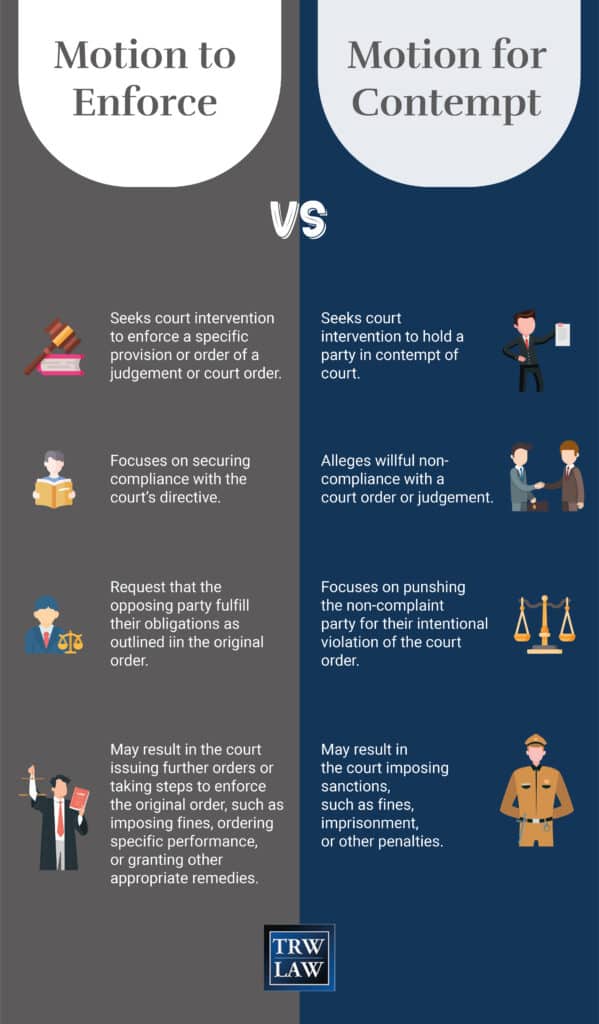- Understanding Legal Motions: In family or divorce legal proceedings, motions play a crucial role in addressing specific issues during a case. They can be oral or written requests made to the court seeking an order, impacting various aspects of the litigation.
- Motions to Enforce: These are filed when a spouse fails to fulfill obligations outlined in the divorce decree, such as paying debts or distributing assets. They serve as reminders of legal duties and are not punitive in nature. They’re typically used for issues like improperly distributed assets or unpaid marital debts.
- Motions for Contempt: Filed when a spouse fails to comply with court orders regarding financial obligations like child support or alimony. Contempt motions can result in legal penalties for the non-compliant party, such as fines or even jail time, and are used in cases of severe non-compliance.
- Key Differences: Motions to enforce serve as reminders of obligations without imposing penalties, while motions for contempt involve legal penalties for non-compliance. The legal requirements and consequences differ between the two types of motions.
- Legal Representation: Having experienced legal representation is crucial in divorce cases to navigate the complexities of motions and ensure favorable outcomes. The Law Offices of Travis R. Walker, P.A., offers expert guidance in divorce and family law matters, serving clients across Florida’s Treasure Coast with professionalism and compassion
Understanding motions to enforce and motions for contempt is imperative for those involved in family or divorce legal proceedings. These motions ensure both parties get what they need and deserve following a divorce. When an ex-spouse fails to comply with a divorce decree or court order, motions to enforce or for contempt can serve as legal reminders of their obligations with associated punishments.
The team at the Law Offices of Travis R. Walker, P.A., has vast experience in divorce and family law fighting for clients in Florida’s Treasure Coast. We can help you understand what particular motions benefit you and pursue those options to best protect your interests.
Overview of Motions in Legal Proceedings
A legal motion is a request made to the court seeking an order. Motions may be made orally in court or filed as written requests throughout a case, depending on the court’s official procedures.
People seeking a divorce may confuse a motion with a petition. The petition is the initial document that a couple files to request a divorce, while motions address specific issues during a case after the petition has already been filed.
Motions can be made before, during, and after the proceedings. Their purposes vary but may affect the overall outcome or various aspects of the litigation, such as testimony, witnesses, and procedures.
What Is a Motion To Enforce?
You can file a motion to enforce with the court when your spouse refuses to perform an obligation, such as pay what they owe toward marital debt, turn over assets, or refinance a mortgage on shared real estate, based on the legal terms of your divorce.
Motions to enforce do not inflict penalties on the non-compliant spouse but serve as legal reminders of their obligations. These are often used in scenarios involving improperly distributed assets or unpaid marital debts. Such items are generally covered under orders of equitable distribution. Since the Florida Constitution spares those who fail to pay their debts from punishment, a motion for contempt is not typically an option.
For example, suppose the court ordered that a shared retirement fund belongs exactly 50 percent to each spouse during a divorce. If the spouse controlling the account fails to pay out the half owed to the other party after significant time, the other spouse may bring a motion to enforce the court’s order. The party seeking their due portion of the account can prove the failure to pay through financial statements and communications between the spouses.
Pursuing your rights through a motion to enforce may be a complex process. Consulting with an experienced divorce attorney is essential. You must file the motions to enforce using a specific form. It is best for a Sheriff or process server to serve the motion directly to the non-compliant spouse to ensure receipt. A hearing will follow at least 30 days after the person has been served, during which you must prove that your ex-spouse did not comply with a previous verdict.
What Is a Motion for Contempt?
You can file a motion for contempt if your ex-spouse fails to comply with a court order regarding certain financial obligations. Motions for contempt punish the offending party for their non-compliance with a former verdict that does not involve a debt or redistribution of funds.
A motion for contempt is most commonly used to collect child support payments owed to the legal guardian who has custody of the children. While you can also seek child support under a motion to enforce, a motion for contempt is commonly used to collect payment in more severe cases where a parent is willfully not paying the child support they owe after numerous attempts to collect it.
Motions for contempt are also available when a party fails to pay alimony. Alimony and child support are not considered “debts” under Florida law. Thus, punishment via a motion for contempt is permitted.
The procedures for filing and responding to motions for contempt are similar to that of motions to enforce, requiring you to file a motion for contempt form and serve it. You must attend a hearing and prove the other person’s failure to follow a court order.
For example, if your ex-spouse has not paid child support for a significant period, you may first decide to file a motion to enforce that will be heard before a Child Support Enforcement Hearing Officer. The court can use several methods in this case to enforce the child support order, including:
- Garnishing wages, which automatically takes the child support funds out of a parent’s paycheck
- Withholding tax refunds for child support
- Suspending a payer’s driver’s or professional license until child support is paid
If none of these tactics work or the amount of child support owed is significant, you may choose to file a motion for contempt. If proven to be in contempt of court, the other parent may be jailed or forced to pay fines on top of paying the child support they owe.
Key Differences Between Motions To Enforce and Motions for Contempt

A few key differences between motions to enforce and motions for contempt under family law include:
- The type of order or agreement at issue: Not every debt is subject to contempt. In Florida, this includes all redistribution of funds following a divorce. However, contempt orders are available for certain financial obligations, like child support or alimony.
- The legal requirements of the process: While the process is similar for both motions, a motion for contempt is considered more severe because it allows the court to impose legal penalties on the accused party. Because of this, the party filing the motion must clearly establish an existing order, that the other party knew about the order, and that they willfully ignored the order before the court will find the other party in contempt.
The consequences of the motion: A motion to enforce, if approved, inflicts no punishment on the non-compliant party and instead serves as a reminder to fulfill their legal duties. Alternatively, a motion for contempt can result in jail time or fines for not following a verdict.
Seeking Legal Representation in Divorce Cases
In divorce proceedings, having reliable, highly-skilled legal representation that understands the nuances of Florida law—including the best strategies for motions to enforce and for contempt—is essential to reach and enforce a desirable result.
With vast experience serving Florida clients throughout Martin, Indiana, and St. Lucie counties, the attorneys at The Law Offices of Travis R. Walker, P.A., are ready to fight for Floridians seeking top-notch legal guidance in divorce cases. Our experienced team of lawyers, administrators, and support staff provides compassionate and efficient service to every client. We’ve continually secured successful outcomes by actively listening to our clients and applying our skills and knowledge.
If you are going through a divorce or need expert legal counsel in family law, estate planning, trust litigation, probate, personal injury, or beyond, our award-winning team in Florida’s Treasure Coast combines professionalism with a personal touch. Protect your family, protect your rights, and start moving forward with help from our attorneys. Schedule a free consultation today by calling 772-708-0952 or filling out our online form.













